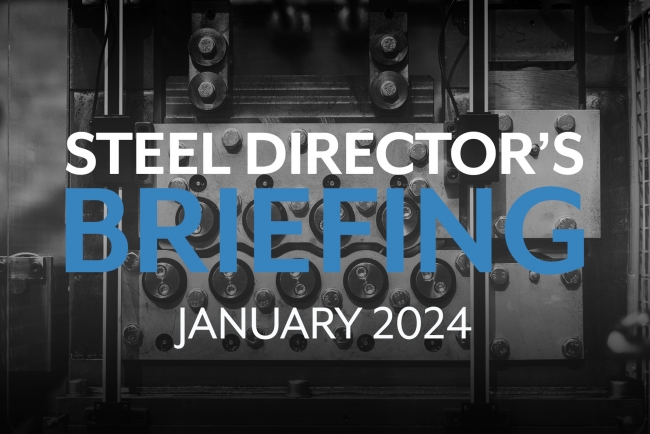The Steel Director's Briefing - January 2024

The UK steel industry finds itself at a critical juncture, precipitated by Tata Steel's recent announcement of its plan to shut down its blast furnaces at its Port Talbot plant by the end of the year and transition to Electric Arc Furnaces (EAFs). This move, backed by a £500 million investment by the UK Government, is expected to reduce carbon emissions by 85% and the UK’s overall emissions by around 1.5%.
Whilst the decision is undoubtedly motivated by environmental considerations, it intersects with some harsh economic realities. Tata Steel UK has been facing persistent profitability challenges in the 17 years since it acquired Corus in 2007 and is now reporting losses of £1 million per day. The reality is that the blast furnaces at Port Talbot have been operating sub-optimally and have required significant investment for some time. Production problems and delays have been a direct consequence of this underinvestment.
In addition to the closure of the blast furnaces, Tata has announced the closure of the Continuous Annealing & Processing Line (CAPL). This adds another layer of uncertainty, particularly concerning the range and quality of steel products. Tata’s batch annealing capacity is inadequate and incapable of producing the quality that many customers depend on.
The hot mill will remain operational but will rely upon imported slab stock during the transition period. Customers have become accustomed to relatively short lead times, but may now face a new reality requiring a fresh approach to purchasing.
The environmental and economic arguments may be compelling, but the timing is certainly questionable and raises many questions.
- How will the town of Port Talbot cope with the loss of up to 2800 jobs?
- What will the impact be on the availability and lead time of specific steel products?
- How will this affect the UK’s wider manufacturing capabilities?
- What implications does this have for the UK’s national security?
If, as expected, material availability is impacted, UK quotas will need to be reviewed as a matter of urgency. Tata is likely to still be producing Hot Rolled and Cold Reduced, albeit in much reduced quantities, so the steel quotas will still apply. This will almost certainly result in material shortages hence the need for immediate clarity.
Regarding pricing, in the UK there has been a gradual uplift, but underlying demand remains weak. The Chinese New Year is normally taken as an opportunity for Far East mills to implement price increases. However, the steel industry will not escape the impact of ships being targeted in the Red Sea by the Houthis rebels. Transit times have increased along with shipping costs meaning that import offers from the Far East are currently not attractive propositions.
Given these conditions, UK manufacturers that depend upon material sourced from Tata UK are understandably concerned about the reliability and sustainability of their supply chains. Tata’s malaise is indicative of decades of underinvestment and a severe lack of strategic direction, and even interest, in UK manufacturing by successive governments. This perceived disinterest has failed to nurture the conditions required for manufacturers to invest with confidence. How different might the landscape look if we had a government that confidently promoted and invested in the UK’s manufacturing capabilities?
At Cooper and Jackson, we remain optimistic, despite these challenges. As a business and an independent service centre, we have built our reputation based upon our expertise in sourcing steel from all over the world in such a way that supply chains remain robust and budgets can be managed effectively. We are therefore well placed to help our customers navigate these uncertain times.
